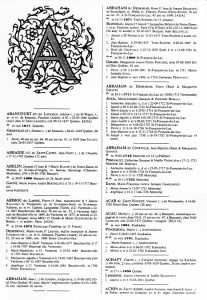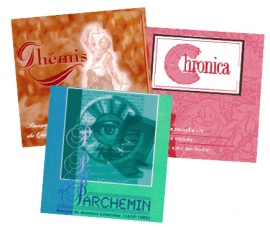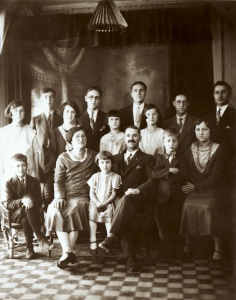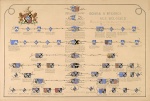Genealogical Research in Quebec
par Fournier, Marcel
Genealogy is above all else a family’s history. It is the study of one’s ancestors, whether it be the first generation or the tenth. A genealogy is the result of a combination of biographical, demographical and sociological research taken from records and archives. Over the years, Quebec has created a niche for itself in this particularly “lively” field of research.
Article disponible en français : Généalogie au Québec
Genealogy: Where Science and History Intersect
Genealogy is a science and close relative to history. It is a discipline whose object is to research and study the origins and make up of families. But beyond the definition itself, one must also note that there are several kinds of genealogies:
-Agnatic (lineage established through male descendants only),
-Patronymic (lineage established from father to son),
-Ascendant (lineage established by moving up both the father and mother’s side of the family—this kind of genealogy is also called a quarter chart)
There are also several other varieties that are generally only of interest to genealogists. These will be explained in greater depth later on, but all to say that a genealogy is much more than a string of names branching out on a tree, set in a table or compiled in a digital database somewhere on a computer.
Remembering a Living Heritage
In 1871 edition of Cyprien Tanguay’s renowned genealogical dictionary, the author writes that tracing one’s origins, as well as that of a whole people group is the labour of a nation or entire people. Quebecois are becoming more and more interested in their origins, as well as history of their patronymic ancestors. This phenomenon has become more widespread due the break up of the nuclear family, a trend that has been developing for a few decades now. The quest for one’s (cultural) identity is a heritage concept that has its roots in the very history of the traditional Quebec family itself. According to UNESCO, the study of family history, or genealogy, is an integral part of intangible cultural heritage, because it involves transmitting or handing down knowledge, whether through writing or oral tradition, from generation to generation within a family.
Tracing one’s origins is re-establishing contact with one’s ancestors, whether they be recent or further up the family tree. Confirming patriarchal or matriarchal relations going back ten or twelve generations is to authenticate one’s heritage and family lines, thereby defining one’s very identity and sense of belonging to a family, a people and even a nation.
Genealogy: a World-wide Phenomenon
Since the 1970s, genealogical research has evolved, expanded and advanced so much that this once secondary discipline of history has become a global phenomenon. This amazing trend in genealogical studies rapidly crossed national borders to spread around the world. There are genealogical experts of all ages, from every strata of society, from a variety of academic backgrounds, a state of affairs that does not exist as such in any other field of study.
Long met with scepticism by meticulously fussy historians, the work of amateur genealogists has grown to such an extent that expert historians have come to recognize the merit of these endeavours—which often involve years of meticulous research—and now constitute an indispensable source of information that has become essential to sociological, demographical and historical research. This does not in any way undermine the detailed and thorough contributions that professionals have made to genealogical research. The works, conferences and workshops of veteran genealogists, such as Archange Godbout, René Jetté, Michel Langlois, Bertrand Desjardins and so many others, trained up an entire generation of fresh new genealogists, who over the years, took their place to become meticulously thorough and prolifically published researchers. Retracez Vos Ancêtres, a practical guide to genealogy by Marcel Fournier suggests numerous resources, research tips and several Websites for researching genealogies in Quebec and elsewhere around the world.
At the beginning of the 20th century, most genealogies were patrilineal and agnatic, which is to say that they involved family ties established from father to son. Today, it is also possible to research family lines that are matrilineal or along uterine lines (involving the mother’s side of the family). This contribution to genealogical research is largely the work of genealogists such as Jeanne Grégoire and Marthe Faribault-Beauregard, who researched, compiled and published several genealogies that established ancestral ties going back through the generations from daughter to mother and so on.
Over the last forty years, genealogists from all over the world have compiled and published a profusion of guides, files, ancestral records and listings, in order to facilitate genealogical research. In addition to the listings or traditional marriage records, it is now possible to research records available on CD-ROM, as well on databases, whether digital, Minitel or online. All these new tools have served to increase public interest in family history and genealogy. Although, in the past, genealogists tended to work alone, that is not the case today, for modern communication technology encourages collective collaboration, so as to enable the production of substantial and complex works of research.
In Quebec, Acadia and Louisiana, as much as in France, Belgium and Switzerland, genealogical research has developed in accordance with the needs and interests of the each of the respective cultural communities, even though France is often the origin of much of the French-speaking world’s genealogical history. Although in close competition with American genealogists whose financial and material resources are almost limitless (one only has to mention the vast body of research compiled by the Mormon Church, as well as the major works of some of the renowned American genealogical societies), French-speaking society is also in the vanguard of the ongoing global development of genealogical science and family history research.
The History of Genealogy in Quebec
Quebec genealogical research goes a bit further back than 150 years, to the end of the 1860s. Notaries, lawyers and priests were the first to become interested in genealogical research and compiled the first family ancestry listings. During the 1930s, Pierre-Georges Roy, Archange Godbout and Gabriel Drouin to a certain extent, carried out most of the genealogical research in Quebec.
In 1943, the genealogical research movement in French Canada was started by the Société Généalogique Canadienne-Française, a whole ten years before the earliest French associations. This new movement taking place in the French Canadian community sought to establish a genealogical collective that would be able to offer an alternative to the Institut Généalogique Drouin, a private society whose archives were not accessible to the public.
Over the course of the 1950s, several branches of the Société Généalogique Canadienne-Française put down roots in the various regions across the Province of Quebec. During the 1960s and 1970s, genealogical research expanded to such an extent that additional societies were founded in various locations, such as those in Quebec City (1961), Sherbrooke (1974) and the Outaouais Region (1978). Simultaneously, as these societies were being founded, the Quebec National Archives opened branches in various regions, such as the one in Montreal in 1971. The establishment of regional centres gave researchers increased accessibility to documentary resources and enabled genealogical research in Quebec to expand and develop even more.
Through the affiliation of Province’s various genealogical societies, the Fédération Québécoise des Sociétés de Généalogie (founded in 1984) sought to promote and facilitate genealogical research. Today, with its some 60 member societies, the Federation still seeks, among other objectives, to encourage genealogical collaboration, a collective dynamic that is essential to ensuring the future of genealogical research in Quebec. The province’s genealogical societies include more than 20,000 members from the Gaspé Peninsula in the east to Abitibi-Témiscamingue in the west and from Saguenay-Lac-Saint-Jean in the north to Montérégie in the south.
Numerous Recent Innovations
Quebec’s genealogical societies have often invented and developed specific research tools for dealing with the particularities of certain regions. Almost all the societies publish a newsletter or review; revise or maintain ancestry listings, including baptism, marriage and burial records; as well as in-depths studies on the history of Quebec families. All these individual endeavours are not an attempt to pit one society’s labours against another. It is rather a united, concerted effort to avidly defend a people’s genealogical interests, whether it be to ensure the accessibility, the conservation or the distribution of genealogical information. One such collective endeavour, the BMS 2000 (the most comprehensive digital database available in the Province of Quebec), is a concrete example of an innovative project that testifies to Quebec’s genealogical research development and its resolve to advance well into the future. The Ficher Origine is another accomplishment that has moved genealogical research in Quebec forward into the future.
Genealogical societies are no longer the only organisations that are responsible for the distribution of genealogical documentary resources. General interest in researching family roots has grown to such an extent that several public libraries and archives have set aside areas that are equipped and adapted to the needs of this new clientele seeking to learn more about their family history. Several historical societies have also sought to enrich their regular selection of activities by offering additional genealogically-themed options. Some have even gone as far as to alter their corporate image, so as to ensure and maintain the fidelity of their clients.
Genealogy in the Future
What will genealogical research look like in the 21st century? That is precisely the question to which we will attempt offer a partial response on the basis of what we know of past trends and current practices. The growing profusion of research tools and the distribution of hard-copy (CD-ROM) and online databases have given researchers almost unlimited access to genealogical resources, whether they be Canadian, American or European.
Currently, within a few hours, researchers can compile an agnatic genealogy comprising 6 to 12 generations by using numerous already existing resources, such as marriage and census records, notary deeds and other documents, as well as family record books. The challenge is no longer to compile a list of one’s ancestors, but to reconstruct authentic family histories. One day it is hoped that every family in Quebec, whether early settler or more recent immigrant or recently arrived might be able to establish their ancestry and family history.
The widespread online availability of numerous databases, and just recently, of civil records, has perplexed many a genealogical society concerned for their future survival. Thus, in coming years, it will be important to create new niches for the societies’ operations or to increase the already existing services they offer, such as training, genealogical information distribution, as well as collective and collaborative genealogical research.
The other major challenge for the future of genealogical research will, without a doubt, be the availability of (and access to) more recent archived records such as civil, nominal census (data relative to names only) and adoption records from the 20th century. Will it be possible to reveal nominal information on our ancestors without violating recent laws passed to protect the confidentiality of personal information, which might end up restricting access to private and public archives?
Even though genealogy is now formally recognized as a sub-field of history, it is much more than that for those who study and research in the field. Although the Fédération Québécoise des Sociétés de Généalogie successfully inaugurated the Bureau d’Attestation de Compétences en Généalogie, university training should still be required in order to become a competent certified genealogist. Thus, one might hope that Quebec universities would be able offer a minimum of training in the field, such as a Minor Certificate in Genealogy, or why not even a Bachelors of Genealogy, such as is offered at certain French universities.
As a science, genealogy certainly has a future in Quebec, particularly as more and more Quebecois are seeking to learn more about their ancestry, whether it be the last generation or 10 generations ago. And so, it is necessary that genealogists and genealogical societies continue to promote the science and double their efforts in order that the story of Quebec’s ancestors, as well as that of our families, remain a concern for one and all.
Marcel Fournier, AIG
Historian and Genealogist
Officer of the Ordre des Arts et des Lettres de France
Additional DocumentsSome documents require an additional plugin to be consulted
Images
-
 Arrivée des Filles du
Arrivée des Filles du
Roy à Québec e... -
 Banques de données ju
Banques de données ju
diciaires, civi... -
 Couverture de l'ouvra
Couverture de l'ouvra
ge Retracez vos... -
 Cyprien Tanguay (1818
Cyprien Tanguay (1818
-1902), auteur ...
-
 Emblèmes héraldiques
Emblèmes héraldiques
de la Fédératio... -
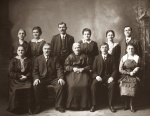 Famille de Célestin F
Famille de Célestin F
ournier, arrièr... -
 Généalogie de la fami
Généalogie de la fami
lle d'Alexis de... -
 Généalogie de la fami
Généalogie de la fami
lle Damours (ve...
-
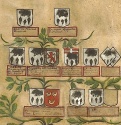 Généalogie de la fami
Généalogie de la fami
lle Damours (ve... -
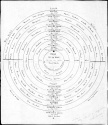 Généalogie de la fami
Généalogie de la fami
lle Lavoie de R... -
 Joseph Drouin, généal
Joseph Drouin, généal
ogiste fondateu... -
 La famille d'Achille
La famille d'Achille
Fournier et d'A...
-
 La famille Demontigny
La famille Demontigny
à Saint-Pierre... -
 Le père Archange Godb
Le père Archange Godb
out, fondateur ... -
 Marcel Fournier, 2010
Marcel Fournier, 2010
-
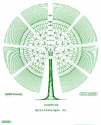 Modèle de tableau gén
Modèle de tableau gén
éalogique: le T...
-
 Première page des ent
Première page des ent
rées «A» du Dic... -
 Première page des ent
Première page des ent
rées «M» du Dic... -
 René Jetté (1944-2003
René Jetté (1944-2003
), auteur du Di... -
 Représentation sur po
Représentation sur po
rcelaine d'une ...
Hyperliens
- Fédération québécoise des sociétés de généalogie
- Genealogy of Canada
- Société généalogique canadienne-française
- Centre de généalogie francophone d'Amérique
- Liste de ressources et outils généalogiques
- Société de généalogie de Québec

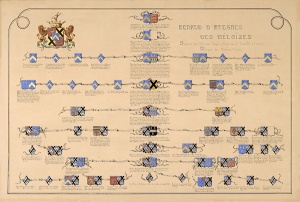
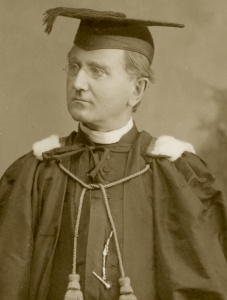
![Cover of the book Retracez Vos Ancêtres, Guide Pratique de Généalogie [Trace Your Ancestral Roots, A Practical Guide to Genealogy]. (Éditions de l'Homme, 2009)](/media/thumbs/4716/209x270-genealogie_19.jpg)
